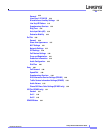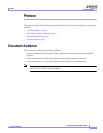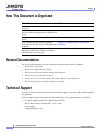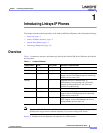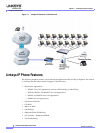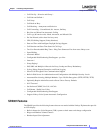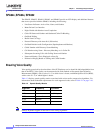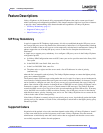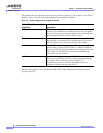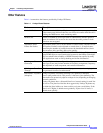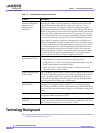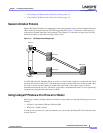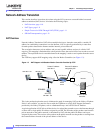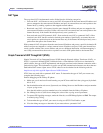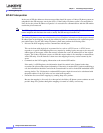
1-5
Linksys IP Phone Administrator Guide
Firmware Version 5.1
Chapter 1 Introducing Linksys IP Phones
Feature Descriptions
Feature Descriptions
Linksys IP phones are full featured, fully programmable IP phones that can be custom provisioned
within a wide range of configuration parameters. This chapter contains a high-level overview of features
to provide a basic understanding of the feature breadth and capabilities of Linksys IP phones.
• SIP Proxy Redundancy, page 1-5
• Supported Codecs, page 1-5
• Other Features, page 1-7
SIP Proxy Redundancy
In typical commercial IP Telephony deployments, all calls are established through a SIP proxy server.
An average SIP proxy server may handle tens of thousands of subscribers. It is important that a backup
server be available so that an active server can be temporarily switched out for maintenance. Linksys IP
phones support the use of backup SIP proxy servers so that service disruption should be nearly
eliminated.
A simple way to support proxy redundancy is to configure a SIP proxy server in the Linksys IP phone
configuration profile.
a. In Linksys SPA Configuration menu web GUI, enter your service provider name in the Proxy field.
The system
b. In the DNS SRV Auto Prefix filed, enter Yes.
c. In the User DNS SRV field, enter Yes.
d. The phone tries to register and the server sends a list of IP addresses in order of priority.
(automatically)
where the list is arranged in order of priority. The Linksys IP phone attempts to contact the highest priority
proxy server whenever possible.
The dynamic nature of SIP message routing makes the use of a static list of proxy servers inadequate in
some scenarios. In deployments where user agents are served by different domains, for instance, it would
not be feasible to configure one static list of proxy servers per covered domain into every Linksys IP
phone. One solution to this situation is through the use of DNS SRV records. Linksys IP phones can be
instructed to contact a SIP proxy server in a domain named in SIP messages. The Linksys IP phone
consults the DNS server to get a list of hosts in the given domain that provides SIP services. If an entry
exists, the DNS server returns an SRV record that contains a list of SIP proxy servers for the domain,
with their host names, priority, listening ports, and so on. The Linksys IP phone tries to contact the list
of hosts in the order of their stated priority.
If the Linksys IP phone is currently using a lower priority proxy server, it periodically probes the higher
priority proxy to see whether it is back on line, and attempts to switch back to the higher priority proxy
whenever possible.
Supported Codecs
Negotiation of the optimal voice codec sometimes depends on the ability of Linksys IP phone to “match”
a codec name with the far-end device/gateway codec name. Linksys IP phones allow the network
administrator to individually name the various codecs that are supported such that the correct codec
successfully negotiates with the far-end equipment.



